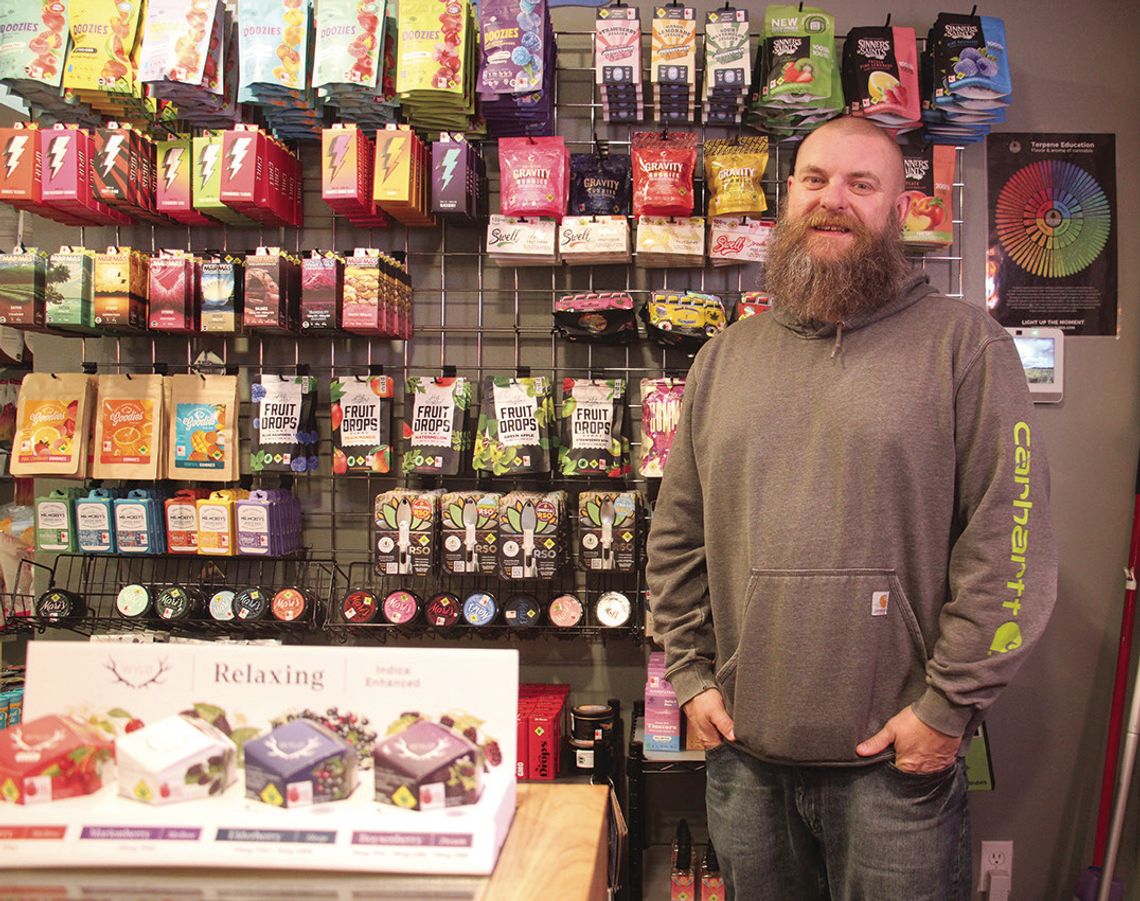NEWPORT – When the state shut down Ty Krohn’s medical marijuana shop in Chattaroy, he wrote off marijuana retail entirely.
Back then in 2016, licenses to sell marijuana recreationally — legalized just four years prior — cost as much as $280,000 each.
“Plus, you had to have $50,000 in your account per license to prove you had money to stock the shelves, basically,” Krohn said. “Well, nobody had that kind of money back then.”
But Krohn’s mother, a “goody-two-shoes” who did not even approve of Krohn opening his medical marijuana shop, convinced him to keep looking for one.
A registered nurse, she began supporting marijuana retail after covering for Krohn at his shop one weekend. Using marijuana can come with health risks as well as benefits. Even so, Krohn’s mother met customers who were grateful for how much the shop was helping them. It had only been open for three months.
“My mom, she didn’t want to quit helping people, so she kept bugging me to keep looking, keep looking,” Krohn said. “And so, we found it.”
With his mother and father’s savings, Krohn managed to buy a discounted license from another former medical marijuana shop owner.
Now, Krohn owns not just one, but two shops in Pend Oreille County. Located at 601 Highway 20 in Newport and 124 E Riverside Ave. in Ione, Pend Oreille Cannabis Company is the only marijuana retailer in the county. It does not have a medical endorsement from the state, but Krohn is in the process of getting one for its Newport location since House Bill 1453 exempts registered patients from paying the sales tax.
“I don’t know if a lot of the owners are as involved as I am still,” Krohn said. “But this was my baby. I started it from nothing.”
He travels there himself once a week, but Krohn said Pend Oreille Cannabis Company’s Ione location is a “one-man show” with only one employee. On other days of the week, Krohn runs Pend Oreille Cannabis Company’s Newport location with the help of a 12-employee team.
“I thank my lucky stars that I have such a good team,” Krohn said. “I was able to put such a good team together because, if it wasn’t for those guys, I would be sunk. There’s no way that one person could do this down here.”
Pend Oreille Cannabis Company opened in Ione in October 2016. Ione was the first town in the county to approve recreational marijuana, followed by Newport in 2017.
In November 2016, Krohn started working with Newport to move Pend Oreille Cannabis Company there. The state allowed Pend Oreille County three licenses; if another owner opened in Newport before Krohn did, he said they would have taken 80% of his customers.
“That was the majority of the reason for the move, was just to survive,” Krohn said.
After a five-year struggle with the city involving code and zoning law changes, Pend Oreille Cannabis Company closed in Ione and re-opened in Newport in April 2022. Krohn later obtained a second license and re-opened in Ione in October 2024.
In the fiscal years since Pend Oreille Cannabis Company opened in Ione, the county has seen over $15.3 million in marijuana retail sales, according to data from the Washington State Liquor and Cannabis Board. Of those sales, more than two-thirds were from 2022–2024. Since 2018, the state has distributed $14,285 of marijuana revenue to Ione and $49,135 to Newport.
“You’ve got a pretty good chunk of money,” LCB spokesperson Brian Smith said. “And it’s going towards healthcare programs, it’s going towards public education campaigns, it’s going to research and it’s going to the general funds too.”
Unlike other marijuana retailers in the state, whose sales Smith said peaked during the pandemic, Pend Oreille Cannabis Company’s sales have only increased since 2018.
Meanwhile, Newport’s tax revenue from sales of alcohol and gas have decreased, partially because of lower taxed competition from Idaho towns like Oldtown and Priest River, Krohn said. But Newport does not have to compete on marijuana sales, as marijuana possession is illegal in Idaho. If caught, people potentially face fines and jailtime. Nevertheless, many cross the Washington-Idaho border to buy from border marijuana shops like Pend Oreille Cannabis Company.
“Now with the store here, we bring some of that revenue back from those guys coming over here to get something that they can’t get over there now,” Krohn said. “So, I think it’s helping the city out a little bit.”
Besides Ione and Newport locals, Krohn’s base of customers includes a few he has done business with since his medical marijuana days.
But Krohn suspects most of his customers — in his words, six to seven per 10 cars that park in his lot — are from Idaho, the border of which is less than a mile from Pend Oreille Cannabis Company’s Newport location. Some of the marijuana retailers close to the border make more than the ones on the other side of the state, Krohn said.
“That’s why they all keep frog-hopping each other as close to the state line as they can get,” Krohn said.
But no matter where they are, all marijuana retailers in the state must follow the same laws — Washington laws.
When used in moderation at low potencies, marijuana can treat conditions ranging from depression to chronic pain, said Dr. Samuel Artzis, Northeast Tri County Health District health officer. But if used too often at high potencies, marijuana can lead to addiction; psychosis and other mental health disorders in those with or without a family history; and cannabinoid hyperemesis syndrome, which can lead to death.
Based on his experience, Artzis said younger users are even more at risk than older ones.
“There are responsible pot users, but if they don’t know, they’re not going to know there’s an issue,” said Artzis, who has himself seen a few patients displaying symptoms of CHS.
To make customers aware of these side effects, Smith said the state requires all marijuana retailers to limit the amount a person can buy in one day from any one shop, post warnings about high-potency marijuana and disclose ingredients upon customer request.
The laws surrounding marijuana retail continue to change, though Krohn said the rate has slowed from 100 changes a month to less than five. And laws are not the only things changing in the marijuana industry.
“The industry is like, every six months there’s something new. … New products, new ways, new things, new rules,” Krohn said. “So, it’s ever-evolving. You gotta pay attention, you gotta be on your feet, I think. Be on your toes.”
Despite it all, what keeps Krohn going has not changed since Chattaroy.
“I love helping people. I love seeing them coming in here smiling because they got a good night’s sleep or their shoulders been killing them or whatever the case may be,” Krohn said. “That’s probably been my all-time favorite thing.”
.png)







